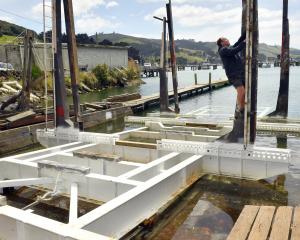A Southland-based forest investment and management company says it cannot accept responsibility for chemical residue found in hay on an organic-certified West Otago farm.
Heriot sheep and beef farmers Allan and Sonia Richardson were shocked to learn residue had been detected following a random audit on their property in April and feared their organic status could be lost.
Chemicals were not allowed in an organic farming system and Mr and Mrs Richardson, who gained AsureQuality organic certification in 2001, were audited annually, along with having random audits every two to three years.
Residue had never previously been detected during an audit and Mr Richardson said the couple knew they were not responsible for it.
They also had great neighbours who were aware of their organic status.
Mr and Mrs Richardson believed the source was spray drift from a farm which had been sprayed for forestry the previous October; the closest point was about 2km away.
The detection was referred to the Ministry for Primary Industries and Mr Richardson contacted the forestry company, IFS Growth, which he said had been very good about the matter.
In response to questions from the Otago Daily Times, IFS Growth founder and managing director Dan Minehan said evidence on the source of spray drift was inconclusive.
The company was an "ethical and responsible" provider of forestry services and it had taken the Richardsons’ concerns very seriously.
Along with information provided by Mr Richardson, it had reviewed the available information from its contractors who were fully certified and had a reputation as among the most experienced operators in the region.
The area sprayed was more than 2km from the Richardsons’ farm, which was at a higher elevation, and there were no visible signs of immediate drift from the company’s prescription zone either in its own land or immediate neighbours’, Mr Minehan said.
The single chemical detected (terbuthylazine was a herbicide used for weed control in forestry) was also used in other agricultural applications including lucerne, peas and even road spraying.
In the company’s application, the chemical was combined in a three-chemical prescription and feedback from advisers was it was "highly unlikely" its spraying was the source.
"We sympathise with Allan and understand the challenges in obtaining organic certification and subsequent audits but based on the available information, we can’t accept responsibility for chemical residue found in Allan’s hay," he said.
While IFS Growth had not accepted responsibility, it had taken the opportunity to review the operational practices for spraying on forestry land it managed to ensure it continued to operate at industry best practice, he said.
Mr and Mrs Richardson were given dispensation to use the more than 50 bales of affected hay which was part of their winter feed budget and their organic status had not been affected.
Whether organic or not, farms should not be getting chemical residue from other properties and Mr Richardson wanted to see something positive come out of the incident.
He believed there should be checks and balances in the forestry industry "so these sorts of things don’t happen".
"You shouldn’t have to get nasty surprises like we did before you stand up and do something," he said.












